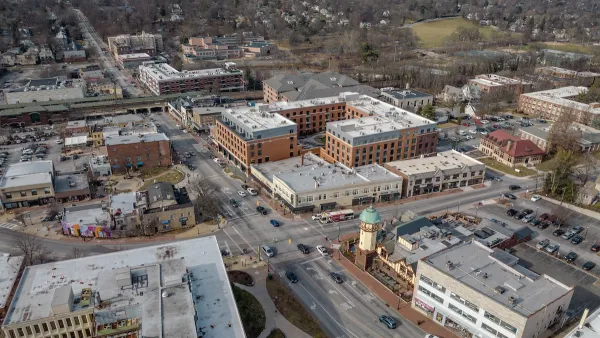A recent panel held at the Museum of Modern Art in conjunction with their current exhibition, Foreclosed: Rehousing the American Dream, provided a reality check for the visionary thinking depicted in the show, writes Jayne Merkel.
We've already heard rebukes from critics who have taken issue with the schemes presented in the Foreclosed show. According to Merkel, at a the recent MoMA panel, it was the developers' turn.
While the panelists -- two developers, an architecture professor, and a real estate lawyer -- didn't seem to take issue with the assumption that the suburbs are in need of wholesale changes due to changing demographic and economic factors, they agreed that changes to zoning laws "to permit denser new development patterns" would be a difficult task, observed Merkel.
Developers are responding to the changes needs of suburban families by changing their products, rather than the regulatory structure. Ara K. Hovnanian, CEO of Hovnanian Enterprises, a national builder of single-family and multi-family housing, observed that, "One new product is 'the multi-generational and multi-household house' which can accommodate 'boomerang children, aging parents, and older siblings teaming up.' These 'homes within a home' have separate entrances but are connected inside. They would be allowed in many areas restricted to single-family homes."
Jonathan Rose, former chairman of the New York City Planning Commission and a partner in the Georgetown Company, a developer of office, residential, and recreational properties across the country, commented that, "Because of recent demographic and economic changes, 'higher density is becoming viable,' but 'it is easier to do this on open land' rather than in older suburbs because of difficulty in re-zoning."
Summarizing the overall theme of incremental versus wholesale suburban change, Ellen Dunham-Jones observed that, "'Market studies show that 30 percent of the population is unhappy with what the market offers,' but you can't really change options until you modify the laws that created suburban development as we know it."
FULL STORY: Reality Check: Developers React to MoMA’s Show, “Foreclosed: Rehousing the American Dream”

Analysis: Cybertruck Fatality Rate Far Exceeds That of Ford Pinto
The Tesla Cybertruck was recalled seven times last year.

National Parks Layoffs Will Cause Communities to Lose Billions
Thousands of essential park workers were laid off this week, just before the busy spring break season.

Retro-silient?: America’s First “Eco-burb,” The Woodlands Turns 50
A master-planned community north of Houston offers lessons on green infrastructure and resilient design, but falls short of its founder’s lofty affordability and walkability goals.

Test News Post 1
This is a summary

Analysis: Cybertruck Fatality Rate Far Exceeds That of Ford Pinto
The Tesla Cybertruck was recalled seven times last year.

Test News Headline 46
Test for the image on the front page.
Urban Design for Planners 1: Software Tools
This six-course series explores essential urban design concepts using open source software and equips planners with the tools they need to participate fully in the urban design process.
Planning for Universal Design
Learn the tools for implementing Universal Design in planning regulations.
EMC Planning Group, Inc.
Planetizen
Planetizen
Mpact (formerly Rail~Volution)
Great Falls Development Authority, Inc.
HUDs Office of Policy Development and Research
NYU Wagner Graduate School of Public Service


























